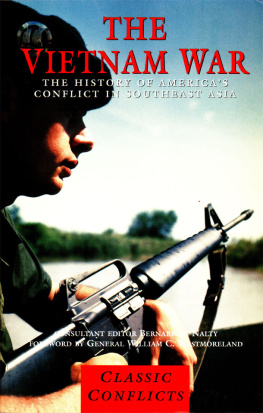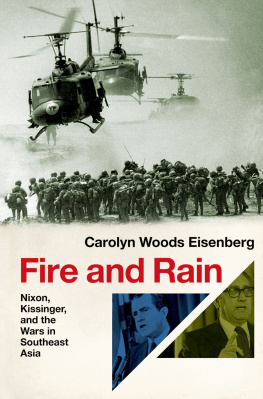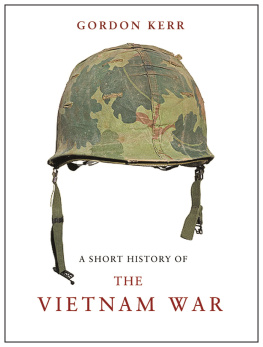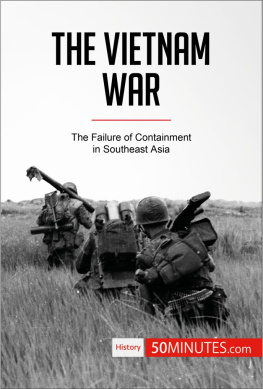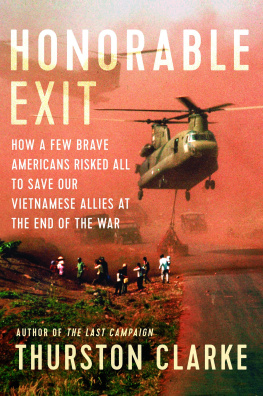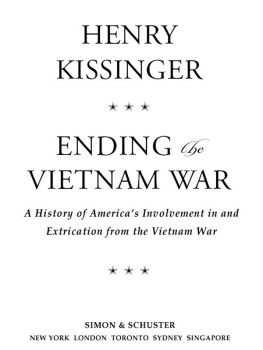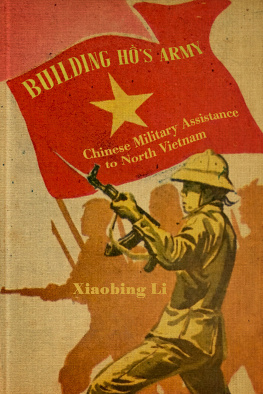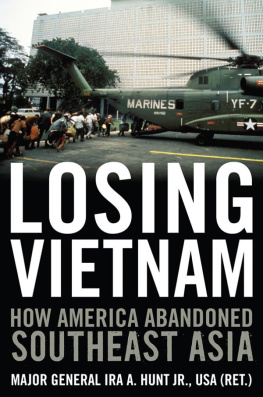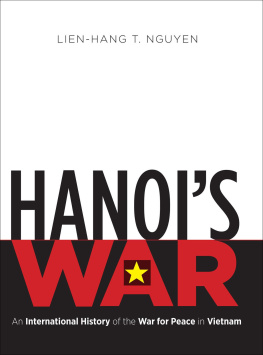CLASSIC CONFLICTS
THE
VIETNAM WAR
CLASSIC CONFLICTS
THE
VIETNAM WAR
THE HISTORY OF AMERICAS
CONFLICT IN SOUTHEAST ASIA
CONSULTANT EDITOR BERNARD C. NALTY
FOREWORD BY GENERAL WILLIAM C. WESTMORELAND

CONTENTS
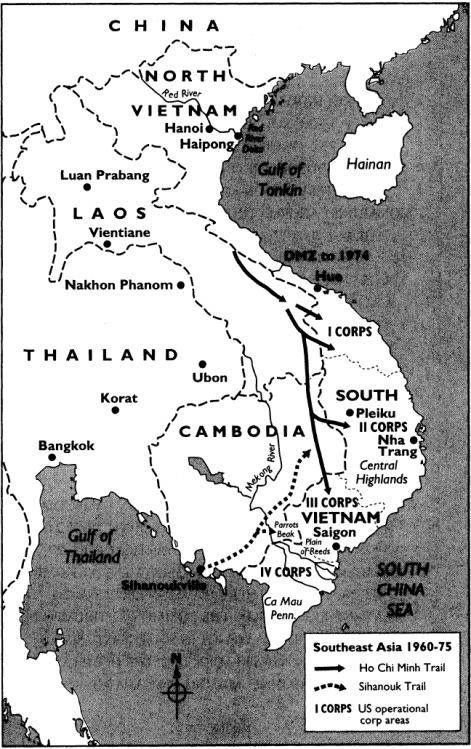
FOREWORD
Twenty-five centuries ago a Chinese warrior-philosopher, Sun Tzu, wrote profoundly on the art of war. Fighting, he declared, is the cruelest form of warfare. He advised, instead:
Break the will of the enemy to fight, and you accomplish the true objective of war. Cover with ridicule the enemys tradition. Exploit and aggravate the inherent frictions within the enemy country. Agitate the young against the old. Prevail if possible without armed conflict. The supreme excellence is not to win a hundred victories in a hundred battles. The supreme excellence is to defeat the armies of your enemies without ever having to fight them.
The Communist leader of North Vietnam, Ho Chi Minh, could hardly have been unaware of Sun Tzus dicta when he devised a strategy both for his war of liberation against France and for his war of aggression against South Vietnam, in which the United States was his principal adversary. Although he was unable to prevail in either conflict without giving battle, he or his successors was able in both cased to exploit and aggravate the inherent frictions within the enemy country and to agitate the young against the old, and in the war with the United States he was also able to cover with ridicule the enemys tradition. In at least some circles, the North Vietnamese succeeded in changing the long established image of the United States as a champion of liberty into that of a big power interfering harshly and inhumanely in the internal affairs of a small nation. In the process, the North Vietnamese broke the will of the enemy to fight and, despite American victory on virtually every battlefield, emerged in the end triumphant.
Therein lies a cardinal lesson for the democracies. No nation should put the burden of war on its military forces alone. It matters not whether a war is total or limited; a nation must be wholly dedicated in its purpose, firm in its resolve, and committed to sacrifice by more than one segment of its society. As the war in Vietnam clearly demonstrated, without that dedication, that resolve, that commitment, no matter what the performance on the field of battle, victory will be elusive.
The interest of the United States in South Vietnam was born in the post-World War II era, when Communist movement into insecure and unstable areas around the world appeared to be a monolithic threat. In that atmosphere, President Harry S. Truman in 1947 pledged the nation to unconditional support of free people who are resisting attempted subjugation by minorities or by outside pressures. Congress approved that doctrine by a large majority.
President Dwight D. Eisenhower in his turn emphasized that policy of containment in association with a strategy of massive retaliation. With South Vietnam much in mind, the Eisenhower administration sponsored the Southeast Asia Treaty Organization, which the Senate in 1955 ratified with only one dissenting vote.
When John F. Kennedy became president, he developed personal interest in the problem posed by a Communist strategy of small wars of national liberation. Chastened by failure at the Bay of Pigs in Cuba and by a personal confrontation with Premier Nikita Khrushchev of the Soviet Union, the young president reputedly told a correspondent for the New York Times: We have a problem in making our power pertinent and Vietnam looks like the place.
President Kennedy set the tone of his administration in his inaugural address, pledging the nation to bear any burden, meet any hardship, support any friend and oppose any foe to assure the survival and success of liberty. To attempt to foil the Communist strategy of wars of national liberation fitted that ideal.
President Kennedy thus sharply increased American involvement in South Vietnam, but in his zeal made the unfortunate mistake of approving American participation in the overthrow of South Vietnams President Ngo Dinh Diem. That action morally locked the United States into Vietnam, and despite political chaos in South Vietnam amply demonstrating a lack of leadership and unity, neither Mr. Kennedy nor his successor, President Lyndon B. Johnson, chose to risk the likely domestic political repercussions of pulling out.
While determined to pursue Mr. Kennedys policy in Vietnam, President Johnson was nevertheless obsessed with his program of domestic achievement, the Great Society. Although he expanded American military commitment, he pursued a policy at home of business as usual. Had it not been for the draft and sensational coverage of the war piped for the first time by television into American living rooms, only those who served and their loved ones would have recognized that the nation was at war.
Despite Congressional endorsement for military action as firm as that provided Truman, Eisenhower, and Kennedy, President Johnson was determined to keep the war limited and publicly announced that he would sanction no expansion of it. That locked American military forces into a defensive strategy, and anyone versed in military history knows that a force on the offensive has advantages over one on the defensive, for the force on the offensive possesses the initiative and can mass its strength at the time and place of its own choosing. North Vietnam had the additional advantage of knowing that its operating bases in neighboring Cambodia and Laos and for the most part in North Vietnam were virtually inviolate. Although those of us in Vietnam were acutely conscious that a defensive strategy contributed to a prolonged war, and that a prolonged war contributed to the success of the strategy the enemy had borrowed from Sun Tzu, we were powerless, in view of the political restrictions, to shift to an offensive strategy and bring the war to a swift conclusion.
Only in the bombing of North Vietnam did President Johnson sanction an offensive strategy, and even in that he bowed to political advice and accepted a selective, on-again, off-again campaign reflecting political pressures at home and abroad. To North Vietnam it must have been clear that the bombing demonstrated not strength and determination but political weakness and uncertainty.
Actions by vocal elements of American society to frustrate the will of the majority, highlighted and sometimes glorified by the news media, no doubt helped convey that message. Illegal war and immoral war became clichs of the times.
In the Gulf of Tonkin Resolution, passed by the Congress in 1964 with only two dissenting votes in both houses, President Johnson obtained clear authority to commit military forces as he deemed necessary to achieve the national objective of assuring a free and independent South Vietnam; but as the war dragged on without decisive American military action, the mood of the Congress changed, a reflection of public attitudes strongly influenced by the news media, particularly television. When the war became intensely controversial, the President should have asked for reaffirmation each year of the Gulf of Tonkin Resolution; indeed, Congressional leaders should have demanded it. Yet neither the President nor Congressional leaders wanted to face open national debate, and a rift between legislative and executive branches of the government was allowed to widen.

